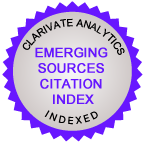Communication, interaction and dialogue. Contributions from Latin America to Educommunication [Bilingual edition: Spanish – English]
-
Delia Crovi Druetta
 crovidelia@gmail.com
crovidelia@gmail.com
Downloads
Abstract
The objective of this article is to review theoretical contributions from Latin American authors to the field of study of educommunication. The premise that guides these reflections states that some of these authors have made pioneering contributions to the educational processes that are based on dialogue and horizontal communication.
In a very early state of the matter we are able to recall names such as Paulo Freire, Mario Kaplún, Juan Díaz Bordenave, Ismar de Oliveira, Jorge Huergo, Guillermo Orozco, Daniel Prieto Castillo, Roberto Aparici, Carlos Valderrama, among others. For the proposed article, it is fundamental to place the contributions from these and other authors within a wider framework: The Latin American communicational thinking, emergent from historic-social and cultural conditions which allowed for a critical and reflective approach to educommunication.
We consider that the contributions from Latin America do not arise as isolated expressions, but rather are the result of a weaving of ideas and viewpoints located in different historical moments. From this predetermined reality, these authors thought, not only from different theoretical viewpoints, but as singular mechanisms in order to face concrete processes which were being carried out in societies lacking dialogue and participation.
Currently, and after more than five decades since the first contributions surrounding dialogicity as a basic element of educommunicational processes, it is necessary to review them in order to rethink them in the context of digitalization. To formulate today dialogue and horizontal communication in education might seem as a simple matter of adapting certain technical developments to pedagogic conditions. However, before thinking about these adaptations, it is necessary to reconsider the history of the Latin American educommunicational thinking, to revise it and reinterpret it, in order to avoid the linear educational and communicational models, in which still prevails the perspective of repeating, submitting and adapting.
Palabras Clave
Similar Articles
- José Luis Torres-Martín, Andrea Castro-Martínez, Pablo Díaz-Morilla, Cristina Pérez Ordóñez, Women executives and creators in the audiovisual sector. Analysis of Spanish fiction series in the catalogs of Amazon Prime Video, Movistar+, and Netflix (2019-2021) , Perspectivas de la Comunicación: Vol. 15 No. 2 (2022): July - December
- Alfredo Arceo Vacas, Rafael Barberá González, Sergio Álvarez Sánchez, The context of perception generated on Twitter for the Spanish electoral debates of December 2015 and June 2016: treatment of the credibility factors by the candidates , Perspectivas de la Comunicación: Vol. 13 No. 2 (2020): July-December
- Estefanía Luzuriaga Uribe, Gabriela Baquerizo-Neira, Twitter/X in the 2021 presidential campaign in Ecuador: digital interactions and their projection in the political polarization of the following campaigns , Perspectivas de la Comunicación: Vol. 18 (2025): (Publishing on a rolling basis)
- Bernadette Califano, Political economy of communication: from its origins to the consolidation of the field in Latin America , Perspectivas de la Comunicación: Vol. 14 No. 2 (2021): July - December
- Lucía Céspedes, Argentinian magazine Ciencia Nueva (1970-1974): an analysis of its contents, graphic resources, advertising, and readership , Perspectivas de la Comunicación: Vol. 12 No. 1 (2019): January - June
- Ramon Ramirez Ibarra, State, freedom, and ideology: digital narratives of the new right for Latin America , Perspectivas de la Comunicación: Vol. 16 No. 1 (2023): January - June
- Minerva Yoimy Castañeda Seijas, The city as the scene of dialogue. Notes from intercultural communication. , Perspectivas de la Comunicación: Vol. 10 No. 2 (2017): Setiembre - Diciembre
- Danielle Tavares Teixeira, Guidelines for a scientific communication policy for the University of the State of Mato Grosso (Brazil) , Perspectivas de la Comunicación: Vol. 12 No. 1 (2019): January - June
- Elena Francés Tecles, Ramón Camaño Puig, Internal communication in primary health centers: A nursing perspective , Perspectivas de la Comunicación: Vol. 16 No. 2 (2023): July - December
- Alejandro Grimson, Marta Rizo García, The affective-emotional dimension in communication theories: gaps and possibilities , Perspectivas de la Comunicación: Vol. 18 (2025): (Publishing on a rolling basis)
You may also start an advanced similarity search for this article.
Downloads
Published
How to Cite
Issue
Section
License
- Proposed policy to offer Open Access Journals
Authors who publish with this journal agree to the following terms:
a) Authors retain copyright and grant the journal right of first publication with the work simultaneously licensed under a Creative Commons Attribution Attribution (CC -BY 4.0) ![]() that allows others to share the work with an acknowledgement of the work's authorship and initial publication in this journal.
that allows others to share the work with an acknowledgement of the work's authorship and initial publication in this journal.
b) Authors are able to adopt licensing agreements for the non-exclusive distribution of the journal's published version of the work (for example, to post it to an institutional repositories or publish it in a monograph), with an acknowledgement of its initial publication in this journal.
c) Authors are allowed and encouraged to post their work online (For example, in institutional repositories or on their website) prior to and during the submission process, as it can lead to productive exchanges and increase the citation of published work (See The Effect of Open Access).











